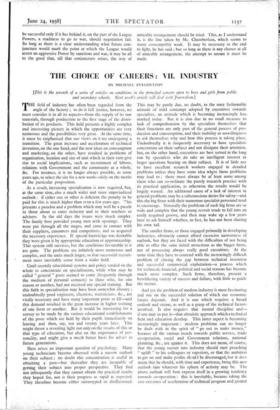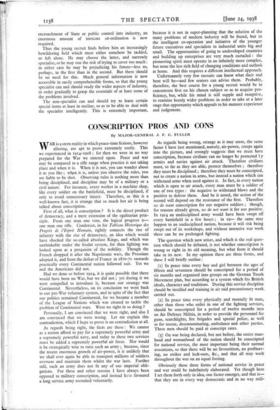TIIE CHOICE OF CAREERS : VII. INDUSTRY
BY MICHAEL ZVEGINTZOV [This is the seventh of a series of articles on conditions in the principal careers open to boys and girls from public and secondary' schools. Next week's article will deal with journalism.] THE field of industry has often been regarded from the angle of the factory ; to do it full justice, however, we must consider it in all its aspects—from.the supply of its raw materials, through production to the first stage of the distri- bution of its products. This field presents a highly complex and interesting picture in which the opportunities are very numerous and the possibilities very great. At the same time, it must be emphasised that our views on it are undergoing a transition. The great increase and acceleration of technical invention, on the one hand, and the new ideas on consumption and marketing, on the other, have resulted in problems of organisation, location and size of unit which in their turn give rise to social implications, such as recruitment of labour, relations with Government and the community as a whole, &c. For instance, it is no longer always possible, as some years ago, to select the site for a new works solely on the merits of the particular proposition.
As a result, increasing specialisation is now required, but, at the same tithe, also a much wider and more unprejudiced outlook : if either one or other is deficient the penalty to be paid for this is 'much higher than even a few years ago. This piesents a paradox and a problem which may well be a puzzle to those about to enter industry and to their teachers or advisers. In the old days the issues were much simpler. The family firm provided young men with openings. They were put through all the stages, and came in contact with their suppliers,' customers and competitors, and so acquired the necessary exPerience. If special knowledge was desirable they were given it by appropriate education or apprenticeship. This system still survives, but the conditions favourable to it are gone. The problems are infinitely more numerous and complex, and the units much larger, so that successful recruit- ment must inevitably come from- a wider field.
Until recently educational systems and policy tended on the whole to concentrate on specialisation, while what may be called " general " posts seemed to come (frequently through the medium of personal contacts) to those who, for one reason or another, had not received any special training. But this faith in specialisation may have been somewhat illusory ; undoubtedly good engineers, chemists, statisticians, &c., are vitally necessary and have many important posts to fill—and this demand resulted in the great increase in higher training of one form or another. But it would be interesting for a survey to be made by the various educational establishments of the posts which are held by their pupils immediately on leaving and then, say, ten and twenty years later. This might throw a revealing light not only on the results of this or that type of education, but also on the importance of per- sonality, and might give a much better basis for advice to future generations.
Here arises an important question of psychology. Many young technicians become obsessed with a narrow outlook on their subject ; no doubt this concentration is useful in obtaining a post—but thereafter they are incapable of getting their subject into proper perspective. They find not infrequently that they cannot obtain the practical results they hoped for, nor is their progress as rapid as expected. They therefore become either stereotyped or disillusioned. This may be partly due, no doubt, to the once fashionable attitude of mild contempt adopted by executives towards specialists, an attitude which is becoming increasingly less , marked today. But it is also due in no small measure to lack of comprehension by the specialists themselves that their functions are only part of the general process of pro- duction and consumption, and their inability or unwillingness to ask themselves why and how this process is taking place. Undoubtedly_ it is frequently necessary to have specialists concentrate on their subject and not dissipate their attention, but, on the other hand, executives are best served in the long run by specialists who do take an intelligent interest in larger questions bearing on their subject. It is of little use to have excellent research workers engaged in . detailed problems unless they have some idea_ where those problem* may lead to ; there must always be at least some among them who can co-ordinate the purely research practice with its practical application, as otherwise the results would be largely wasted. An additional cause of a lack of interest in general problems may be a.subconscious desire for safety—and this the. big firms with their numerous specialist personnel tend to encourage. Naturally the problems of such big firms are so wide and complex that the young recruit tends to fall into an easily acquired groove, and then may wake up a few years later to ask himself whether, in fact, he has not been chasing his own tail.
The smaller firms, or those engaged primarily in developing industries, obviously cannot afford excessive narrowness of outlook, but they are faced with the difficulties of not being able to offer the same initial attractions as the bigger firms, nor of possessing always really good executives. At the same time they have to contend with the increasingly difficult problem of closing the gap between technical invention and successful commercial exploitation—a process which for technical, financial, political and social reasons has become much more complex. Such firms, therefore, present a bewildering variety of success and failure, with little to guide the recruit.
And yet the problem of modem industry is most fascinating and one on the successful solution of which our economic future depends. And it is one which requires a broad outlook and vision, as well as a grasp of the technical factors involved. It also requires that mental discipline and— if one may so put it—that altruistic approach which a technical bent and education develop. This latter aspect is becoming increasingly important : modem problems can no longer be dealt with in the spirit of " go out to make money," because all the various trends towards public service, trade co-operation, social and C-overnment relations, national planning, &c., are against it. This does not mean, of course, that the young recruit into industry should start preaching " uplift " to his colleagues or superiors, or that the ambition to get on and make profits shouli be discouraged, but it dots mean that he should, with time and experience, bring this new outlook into whatever his sphere of activity may be. The above outlook will best express itself in a growing tendency towards co-operation : this is inevitable, because taking the two extremes of acceleration of technical progress and greater encroachment of State or public control into industry, an enormous amount of intricate a5-ordination is now required.
Thus the young recruit finds before him an increasingly bewildering field which must either somehow be tackled, or left alone. He may choose the latter, and narrowly specialise, or he may run the risk of trying to cover too much : in either case he may be prejudicing his future—less so, perhaps, in the first than in the second. But there should be no need for this. Much general information is now accessible in easily comprehensible forms, so that the young specialist can and should study the wider aspects of industry, in order gradually to grasp the essentials of at least some of the problems involved.
The non-specialist can and should try to learn certain special items at least in outline, so as to be able to deal with the specialist intelligently. This is extremely important, because it is not in super-planning that the solution of the many problems of modern industry will be found, but in the intelligent co-operation and initiative of the younger future executives and specialists in industrial units big and small. The opportunities of going to undeveloped countries and building up enterprises are very much curtailed : the pioneering spirit must operate in an infinitely more complex, but none the less rich field of changing conditions and outlook at home. And this requires a different intellectual approach.
Unfortunately very few recruits can know what their real bent will be—and few seniors can advise them. Probably, therefore, the best course for a young recruit would be to concentrate first on his chosen subject so as to acquire pro- ficiency, but, while his mind is still supple and receptive, to examine keenly wider problems in order to take at a later stage that opportunity which appeals to his maturer experience and judgement.















































 Previous page
Previous page